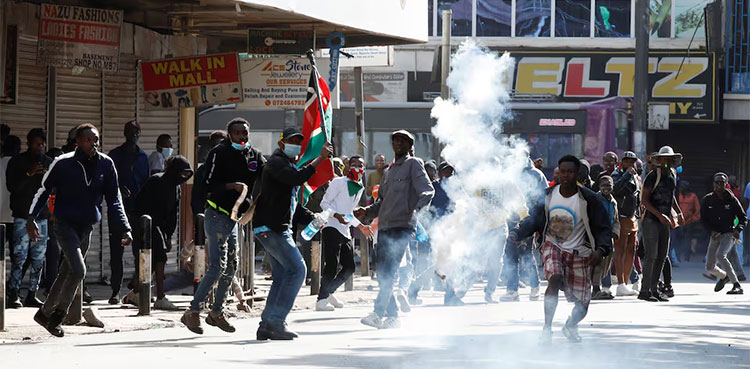NAIROBI, Kenya: Kenyan police patrolled the streets of the capital Nairobi on Thursday, roadblocks were set up on major arteries and many shops were shut ahead of planned new anti-government protests.
The East African nation has been rocked by weeks of sometimes deadly demonstrations mostly led by young Gen-Z Kenyans against President William Ruto’s two-year-old administration.
The nation’s acting police chief had warned on Wednesday that “criminals” intended to infiltrate the demonstrations and said people should not trespass on avoid “protected areas” such as the main international airport and State House, the president’s official residence.
In a post on X, the acting inspector general of police Gilbert Masengeli said, “adequate security personnel” had been deployed, but advised the public to “take extra caution while in crowded areas that are likely to turn riotous”.
While the rallies — which began in June — have become smaller in recent weeks, posters shared online called for fresh demonstrations, dubbed “Nane Nane” or Eight Eight in Swahili, to signify the date, August 8.
In his statement Wednesday, Masengeli warned about “criminals planning to infiltrate tomorrow’s Nane Nane demonstrations and commit further crimes”.
Organisers of the protests have in the past accused “goons” of hijacking their plans for peaceful action and of stoking violence.
At least 60 people have been killed since the protests began. They started out as peaceful rallies against controversial proposed tax hikes but have ballooned into wider action against Ruto and what many see as profligate government spending and corruption.
Police have been accused of using excessive force, sometimes firing live bullets at protesters, while dozens of people have gone missing, according to rights groups.
Government spokesman Isaac Mwaura on Wednesday urged young Kenyans to “avoid unchecked protests, which could lead to further economic hardships and hinder their chances of gaining employment”.
Mwaura also claimed the spread of misinformation had contributed to the protests, telling people to “ignore these calls to violence”.
In a bid to tackle the worst crisis of his presidency, Ruto has taken a series of measures to address public anger including scrapping the tax hikes, revamping his entire cabinet and making deep budget cuts.
He has found himself caught between the demands of international lenders to shore up government finances to enable it to pay down its massive $78 billion debt, and ordinary Kenyans who are struggling with a cost-of-living crisis.



Leave a Comment